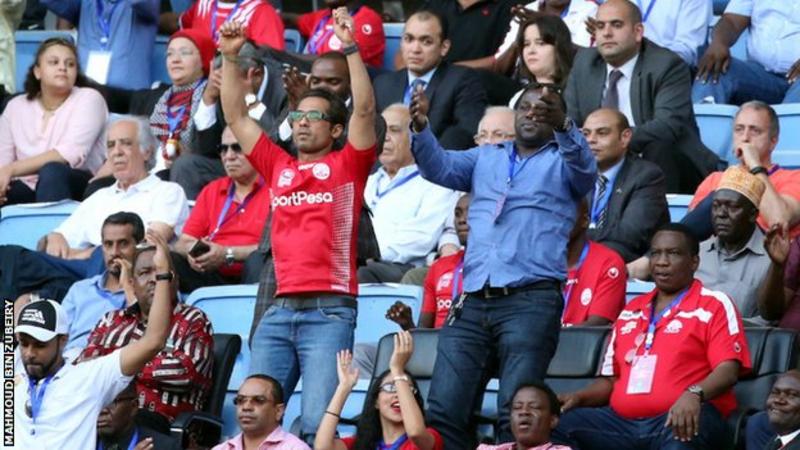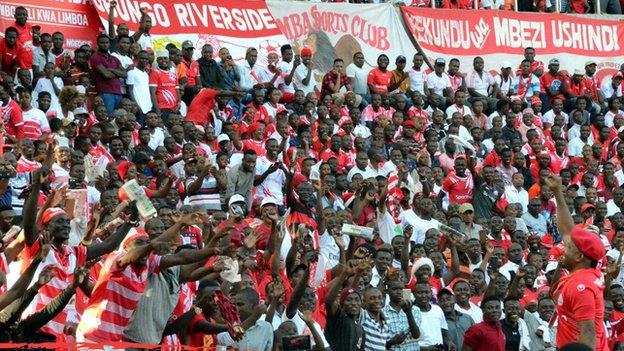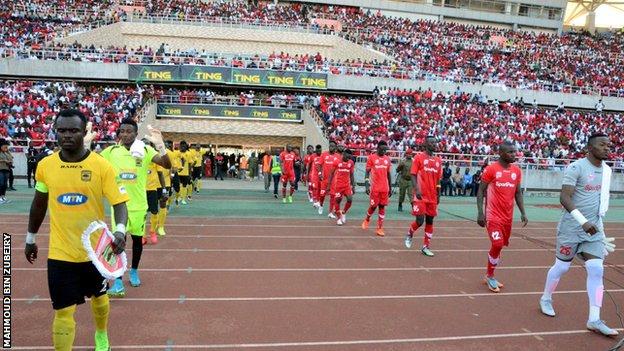On Tuesday fans of one of Tanzania’s oldest clubs will gather at the National Stadium in Dar es Salaam to celebrate “Simba Day”.
It is the culmination of “Simba Week” and features a friendly for the senior team against Zambia’s Power Dynamos as well games for the under-20 and women’s teams.
The seven days of events are aimed at more interaction between the club’s fans and the players as well as Simba helping out the local community with corporate social responsibility projects.
It is all part of the vision of the club’s part-owner and billionaire Mohammed Dewji to grow the club off the pitch in order to ensure even more success on it.
“I happened to meet one of the leaders of Zamalek (back in 2003) and I realised at that time that the budget of Zamalek was 50 times more than the budget of Simba,” he recalls to BBC Sport.”
“I would compare it with a great driver driving a Toyota and another driver driving a Ferrari – there’s only so much you can do.”
Dewji’s vision
On his return to Tanzania after that African Champions League encounter Dewji understood things needed to change in the way the club was run if they were to compete on the field of play.
At the time his suggestions to change the club’s ownership structure were not take on board and he walked away from Simba in 2004.
Then 11 years later, on a local television station he discussed what he would do to triple the club’s budget, investing in infrastructure and how they could close the gap on Africa’s biggest clubs.
“It was kind of a joke but Simba were not doing well and this joke caught fire,” he explained.
Two years later that ‘joke’ saw the boyhood Simba fan return to acquire a 49% stake in the club.
That takeover and change in structure into a public limited company, which was approved by Simba members, acted as the launch-pad for last season’s success.
In 2018 they were able to embark on a pre-season trip to Turkey and recruit quality players to deepen their squad so they could complete domestically and continentally.
Furthermore, they are able to invest in key infrastructure, including building a modern stadium and training ground.
Simba achieved both their goals for last season – winning the league and reaching the group stages of the Champions League, in fact they did even better by reaching the quarter-finals of the continental club competition.
Despite managing to more than double the club’s annual budget Dewji knows it is significantly less than the continent’s most successful clubs but believes they will match them financially in the next five years.
“The last two years we have doubled our budget from around $1m a year to around $2.5m (UShs3.69bn) (UShs9.2bn),” Dewji explained.
“We will partner with companies like Mohammed Enterprises and Total. We know that every Tanzanian needs to buy oil, rice and sugar.

“If they (registered fans) go and buy a product from Mohammed Enterprises they will get a discount and in return the partners will give them enough value for that transaction.”
Bringing in the fans
Another way the club is aiming to compete is improving the club’s engagement with its fans.
“We are reaching out. We have created a huge database. We have targeted the right value in terms of gate entrance,” Dewji continued.
“We have created a lot of hype about it. We have created a close connection with newspapers and radio stations. I still believe we have just touched the tip of the iceberg.”

Simba have tried to make football affordable and appealing for all with ideas such as lower category ticket prices that appeal to those with a small disposable income.
While at the other end of the scale there are platinum level tickets for those better off that include a Simba shirt, free parking, coach travel to and from the stadium and VIP seats.
The passion of their 60,000 fans for home games has caught the attention of many African football watchers.
“I was speaking to the Caf President Ahmad and he said he has never seen African fans filling stadiums game in game out like they did for Simba. Our strategy to be transparent is paying out.”
That openness has encouraged a closer bond with the fans and Dewji has emphasised the importance of it to his board members.
“Simba is a big club. It is a big brand,” he added.
“It is our responsibility as leaders of this club and as an owner of this club that A) we need to be very ethical in what we do B) we need to be very transparent in what we do C) we need to communicate with our fans through the media to explain what our vision is.”
Simba’s influence on the national team
Simba’s success is also having a knock on effect for Tanzania’s national team too as the Taifa Stars qualified for its first Africa Cup of Nations finals in 39 years.
Dewji stepped in to lead a committee that ensured Tanzania’s crucial qualifier against Uganda was backed by a huge campaign of fan support.
“Seeing so many fans gave us the strength to go and battle to qualify,” said national team midfielder Himid Mao, who plays for Egyptian side Petrojet.
“When we were on the way to the stadium seeing so many fans made us feel like we had a debt to them.”
The plan worked with the fans cheering the side to a comfortable 3-0 win, including a penalty from Simba’s Ernesto Nyoni, over their neighbours to reach Egypt.
Nyoni was one of four Simba players in the Taifa Stars squad in Egypt alongside regulars John Bocco goalkeeper Aishi Manula, as well as substitute Mohamed Hussein.
Indeed there were also two Simba players in Uganda’s squad in Egypt in Murushid Juuko and Emmanuel Okwi, who has since left to join Egypt’s Al Ittihad.
Simba’s aspiration is now to win the Champions League and with the business-savvy Dewji in the driving seat, the car that could not compete appears to be moving in the right direction and gathering pace.
Credit: BBC





